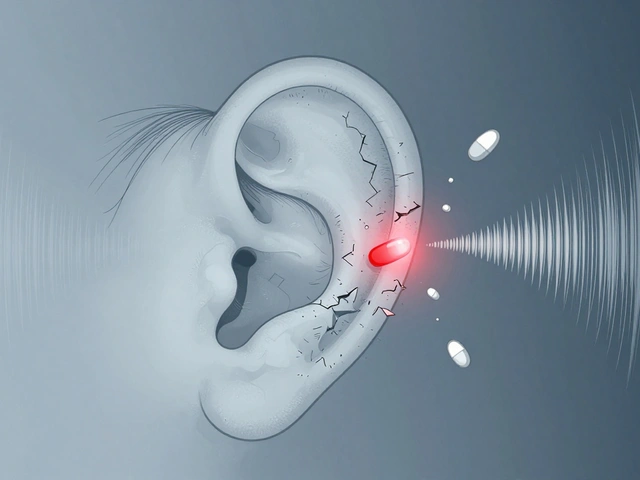Understanding Sildenafil Citrate and Its Uses
Sildenafil Citrate, commonly known as Viagra, is a medication used to treat erectile dysfunction (ED) and pulmonary arterial hypertension (PAH). It works by relaxing the blood vessels in the penis, allowing increased blood flow and thereby facilitating an erection. This medication has been a game-changer for many men who suffer from ED, as it has helped them regain their confidence and enjoy a healthy sex life.
But did you know that there might be a potential connection between Sildenafil Citrate and dementia? In recent years, researchers have been exploring the possible benefits of this medication for individuals with cognitive decline. In this article, we will delve into the science behind this intriguing connection and discuss what it could mean for the future of dementia treatment.
The Link Between Sildenafil Citrate and Dementia
Several studies have suggested that Sildenafil Citrate might have a positive impact on cognitive function. One such study, published in the journal "Current Alzheimer Research," found that the drug improved memory and cognitive performance in mice with Alzheimer's disease. The researchers believe that Sildenafil Citrate may enhance the brain's ability to form new connections and strengthen existing ones, which could be beneficial for individuals with dementia.
Another study, published in the "International Journal of Impotence Research," found that men with erectile dysfunction who were treated with Sildenafil Citrate showed significant improvements in cognitive function. The authors of the study suggest that the drug may have potential neuroprotective effects, which might help slow down the progression of dementia in patients with cognitive decline.
How Sildenafil Citrate Might Help Fight Dementia
Although the exact mechanism is not yet fully understood, researchers believe that Sildenafil Citrate may help fight dementia in several ways. First, the drug increases blood flow to the brain, which can help deliver more oxygen and nutrients to brain cells. This increased blood flow might contribute to improved cognitive function and memory.
Second, Sildenafil Citrate has been shown to reduce inflammation in the brain. Inflammation is known to contribute to the development of Alzheimer's disease and other forms of dementia, so reducing inflammation could potentially slow down the progression of these conditions.
Finally, some researchers believe that Sildenafil Citrate may help stimulate the growth of new brain cells, a process known as neurogenesis. This could be particularly beneficial for individuals with dementia, as it could help replace damaged or lost brain cells and improve overall cognitive function.
Current Clinical Trials and Research
Given the promising results from animal studies and preliminary human research, there are currently several clinical trials underway to further investigate the potential benefits of Sildenafil Citrate for individuals with dementia. These trials aim to determine the safety and efficacy of the drug for treating cognitive decline, as well as to better understand how the drug might work to improve brain function.
One such trial, conducted by the University of Manchester in the United Kingdom, is focused on determining whether Sildenafil Citrate can help reduce the symptoms of Alzheimer's disease in patients who are already taking standard treatments for the condition. The results of this trial are expected to provide valuable insights into the potential benefits of the drug for individuals with dementia.
Potential Risks and Side Effects
While the potential benefits of Sildenafil Citrate for individuals with dementia are intriguing, it is important to be aware of the potential risks and side effects associated with the drug. Some common side effects of Sildenafil Citrate include headaches, flushing, indigestion, and nasal congestion. More serious side effects, although rare, can include sudden vision or hearing loss, chest pain, and an erection lasting more than four hours.
Additionally, Sildenafil Citrate may interact with certain medications, such as nitrates and alpha-blockers, which can cause potentially dangerous drops in blood pressure. It is crucial for individuals considering Sildenafil Citrate for dementia treatment to discuss the potential risks and benefits with their healthcare provider before starting the medication.
Future Possibilities for Dementia Treatment
If the ongoing clinical trials and research continue to show positive results, Sildenafil Citrate could potentially become a valuable tool in the fight against dementia. By improving blood flow to the brain, reducing inflammation, and promoting neurogenesis, this medication may help slow down the progression of cognitive decline and improve the quality of life for individuals with dementia.
However, it is important to note that Sildenafil Citrate is not a cure for dementia, and more research is needed to fully understand its potential benefits and limitations. In the meantime, individuals with dementia and their caregivers should continue to work closely with their healthcare providers to determine the best course of treatment for their specific needs and circumstances.
Conclusion
The connection between Sildenafil Citrate and dementia is an exciting area of research that holds promise for the future of dementia treatment. While more studies and clinical trials are needed to fully understand the potential benefits of the drug, the preliminary findings are certainly encouraging. As we continue to learn more about this connection, individuals with dementia and their caregivers can remain hopeful that new and innovative treatments are on the horizon.






Emily Barfield
This is wild. I mean, really-sildenafil? The little blue pill? Now it's potentially rewiring our brains? I feel like we're living in a sci-fi novel where every drug is secretly a magic wand. Neurogenesis? Reduced inflammation? Blood flow? It's almost too poetic. Like the universe whispered, 'Let there be more oxygen to the hippocampus,' and someone handed a man a prescription. I'm not just intrigued-I'm emotionally overwhelmed. This changes everything. Or does it? I don't know anymore.
Bradley Mulliner
Let’s be real. This is just another case of pharmaceutical companies chasing a second market after the ED boom. They see an aging population, panic, and throw a drug at the wall hoping it sticks. The study size? Tiny. The mechanism? Speculative. And now we’re treating dementia like it’s a case of poor circulation? Wake up. If this were real, we’d have seen it in decades of cardiac research. This is snake oil with a DOI.
Rahul hossain
In my country, we have long believed that the body is a vessel, and the mind its lantern. To suggest that a drug designed for physical arousal could illuminate the dimming lantern of cognition is... poetic, yes. But also dangerous. We do not treat the soul with pills meant for the flesh. This is not medicine. It is metaphor made chemical. And metaphors, when misused, lead to ruin.
Reginald Maarten
Actually, the study cited in Current Alzheimer Research used transgenic APP/PS1 mice-not humans-and the dosage was 10 mg/kg, which translates to roughly 700 mg for a 70kg human. That’s nearly 14x the standard ED dose. The paper itself states, 'Further investigation is required.' Also, PDE5 inhibition affects cGMP, which modulates synaptic plasticity, but the link to neurogenesis is correlative, not causal. And the International Journal of Impotence Research paper? It had a sample size of 47. No control group. You can't extrapolate cognitive improvement from erectile function without controlling for confounders like depression, cardiovascular health, or sleep quality.
Jonathan Debo
I mean, let’s not pretend this isn’t just a rebranding of ‘Viagra for the brain.’ The pharmaceutical industry doesn’t do altruism. They see a demographic shift-millions of aging boomers-and they pivot. The science? Thin. The marketing? Aggressive. And now we’re supposed to believe that a drug that causes headaches and blue vision is also a cognitive enhancer? Please. If it were that effective, we’d have seen it in stroke rehab, TBI, or even post-op cognitive decline. But we haven’t. Because it’s not. And the authors? They’re probably on a consultant retainer.
Robin Annison
I’ve been thinking about this a lot. Not as a cure, but as a possibility. What if, instead of fighting dementia head-on, we just... gave the brain a little more oxygen? A little more room to breathe? I don’t know if it works, but the idea that something so simple-a pill meant for desire-could also help with memory... it’s tender, in a way. Like the body remembers what the mind forgets. I’m not jumping to conclusions. But I’m holding space for hope.
Abigail Jubb
I’ve been watching my grandmother fade. Every day, she forgets my name. I’ve cried into her pillow. And now you’re telling me that a blue pill might bring her back? Don’t you dare romanticize this. Don’t you dare turn her suffering into a headline. If this is real, I’ll take it. But if it’s not? Don’t give me false hope. Don’t sell me a dream wrapped in a prescription. I’ve seen too many miracles turn to dust.
George Clark-Roden
I read this article and I just... sat there. For ten minutes. I thought about my father. How he used to sing to me when I was small. How he forgot how to tie his shoes. How he looked at me once and didn’t know who I was-but smiled anyway. And now, maybe, just maybe, there’s a pill that could help him remember the sound of my voice? I don’t know if it’s real. But I want to believe it. Not because it’s science. Because it’s love. And love doesn’t need a double-blind trial to be true.
Hope NewYork
ok but like... is this just viagra for old people? like why are we even talking about this? i thought it was for boners. now its for brain? so if i take it will i remember where i put my keys? or will i just get an erection while i’m at the grocery store? idk man. this feels like a scam. also who even wrote this? it sounds like a college student who got high and googled ‘dementia’ and ‘viagra’ at the same time.
Bonnie Sanders Bartlett
I’m just glad someone’s looking at this. My husband has early-stage dementia, and we’ve tried everything-music therapy, puzzles, walks, memory books. If there’s even a small chance this helps, I’ll take it. Not because it’s a miracle. But because he deserves a little more time. A little more clarity. I don’t need a cure. I just need more moments where he looks at me and says my name. If this helps, I’ll be grateful.
Melissa Delong
This is a distraction. A smokescreen. The real cause of dementia? 5G, glyphosate, and the CDC’s secret brainwashing program. They’re pushing this drug because they don’t want you to know the truth. Why? Because if people start taking sildenafil and feel better, they’ll stop asking why their Wi-Fi router is in their bedroom. They’ll stop questioning the fluoridated water. They’ll stop seeing the pattern. This is control. And it’s dressed up in lab coats.
Marshall Washick
I read Reginald’s comment. And I agree with every word. The data is weak. The sample sizes are tiny. The mechanisms are plausible but unproven. But... I also read George’s comment. And I thought of my mother. And I realized something. Science doesn’t always need to be perfect to matter. Sometimes, it just needs to be possible. And maybe, just maybe, that’s enough.